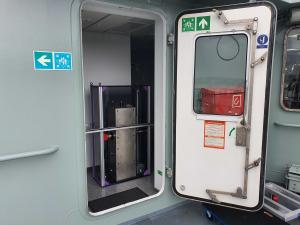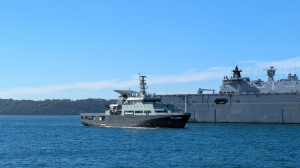Software-ruggedized quantum sensing technology for navigation is validated in a real-world environment on a naval vessel after one year of development
SYDNEY, AUSTRALIA, July 16, 2025 /EINPresswire.com/ -- Q-CTRL, the global leader in quantum infrastructure software, today unveiled groundbreaking advancements in software-ruggedized quantum sensing for navigation in a major field trial with Australian Defence on board the Royal Australian Navy’s Multi-role Aviation Training Vessel (MATV), MV Sycamore. The results of this major maritime trial reinforce Q-CTRL’s leadership in the development and deployment of quantum-assured navigation solutions, now expanding into maritime operations.“Quantum sensors provide a near-term opportunity to achieve transformational defense capabilities, but previous deployments in the field have struggled to deliver defense-relevant performance,” said Q-CTRL CEO and Founder, Michael J. Biercuk. “Operating on a real moving vehicle is just not the same as conducting a science experiment; at Q-CTRL, we’ve taken a different approach to getting quantum sensors out of the lab, focusing on software as the critical enabler of performance in the real world.”
In these trials, Q-CTRL field deployed a quantum dual gravimeter, which measures tiny variations in Earth’s gravity as part of a next-generation quantum-assured positioning, navigation, and timing (PNT) system operable when GPS is unavailable or untrusted.
This first trial saw over 144 hours of continuous operation and successful data collection with no human intervention during real maritime operations.
Earlier this year, Q-CTRL announced successful airborne field trials of a new generation of quantum-magnetic navigation solutions, Ironstone Opal, validated for the first time to outperform comparable conventional alternatives in challenging real-world settings by 50x.
The newly announced trials of Q-CTRL’s gravimetric navigation technology now open opportunities to bring quantum-assured navigation to maritime vessels where magnetic navigation can be less effective.
GPS denial has become one of the most pressing strategic challenges in both defense and commercial settings, risking major disruptions to civilian and military operations. Quantum navigation promises a robust and reliable GPS backup that cannot be jammed or spoofed.
Q-CTRL’s navigation capability is urgently needed in contested maritime environments, as instances of “spoofed” signals caused significant disruptions to ships in the Middle East waterways as recently as June 23. This causes not only critical logistical issues but disrupts collision avoidance efforts, revealing major safety implications.
"We expect the quantum sensing market to reach $3bn-5bn by 2030,” said Jean-Francois Bobier, Partner & Vice President, Deep Tech, at the Boston Consulting Group. “Especially amid heightened cases of GPS denial, field-validated quantum sensors are more important than ever for navigational safety. With clear use cases and early adopters in the defense industry, Q-CTRL’s achievements pave the way for future economies of scale and broader adoption."
In quantum gravimetric navigation, the quantum gravimeter continuously “sees” the otherwise invisible hills and valleys in Earth’s gravity, allowing a navigation computer to compare its observations against known gravity maps. This is similar to orienteering, where one can position oneself on a map by identifying landmarks like valleys, mountains, rivers, or roads. GPS is not needed, making it a robust backup in contested regions.
Q-CTRL’s demonstration with the Royal Australian Navy departs from most previous quantum sensing field trials in that these tests mandated peak performance with full autonomy and without the addition of any special infrastructure. The sensor had to operate just as a real navigation system would operate during a defense mission.
Developed and successfully fielded in just 14 months, the dual gravimeter was installed in a “strapdown” configuration (bolted to the floor) in the space of a single server rack in a communications room onboard MV Sycamore. The sensor consumed only 180W of power – about 10 times less than a household toaster, setting a record for SWaP (size, weight, and power).
Moreover, in this trial, the ship’s motion and engine vibrations were sufficient to cause total loss of signal using conventional operating techniques typically employed in research experiments. To address these losses, Q-CTRL’s unique software-ruggedization strategies recovered operation at near world-record levels even while MV Sycamore was underway, allowing the team to outpace international competitors interested in similar technology.
Quantum sensing leverages the physics of light and matter on the smallest scales to enable the detection of tiny signals. Because these devices work based on the fundamental laws of physics and are not affected by drift like other GPS alternatives, their outputs do not change over time, enabling new opportunities where long-term stability is essential. Generally, however, these devices are significantly degraded when taken from a research laboratory into the real world, an issue addressed by Q-CTRL’s software-ruggedization technology.
For more details on Q-CTRL’s software-ruggedized quantum sensing technology, read their peer-reviewed technical demonstration published in Nature.
Editor’s note
Q-CTRL's innovations in quantum sensing promise real-world benefits in critical applications including crewed and autonomous vehicle navigation, minerals exploration, and underground water monitoring. With BCC Research projecting the sensing market to surpass $300 billion by 2025, quantum sensing is poised to capture a significant market share from existing classical technologies due to its enhanced performance.
Unavailability of GPS poses a risk valued at over one billion dollars per day for short-term outages in the US alone. Recent GPS disruption events have impacted commercial aviation and maritime trade operations, prompting a renewed focus on developing reliable GPS alternatives.
When applied to the problem of GPS-free navigation, quantum sensors can detect multiple signatures, enabling safe navigation over extended periods – not for hours, but for weeks or months. Q-CTRL has built a portfolio of quantum-assured navigation solutions delivering new capabilities in all relevant operating environments. This includes gravimetric navigation for maritime vessels described here, magnetic navigation for airborne applications, and a new generation of quantum inertial sensors.
Defense engagement
Q-CTRL announced in 2023 a partnership with the Australian Department of Defence to deliver quantum-assured navigation for defense platforms. In addition, it has been contracted by the UK’s DASA accelerator and supported by the UK Royal Navy via the Disruptive Capabilities and Technologies Office to field trial mobile quantum-assured gravimetry for maritime operations. The company was recently awarded a U.S. Defense Innovation Unit program in quantum navigation and has been separately selected to develop and trial its quantum navigation systems with the U.S. Department of Defense.
About Q-CTRL
Q-CTRL is a key player in the global quantum technology industry as a category-defining business for AI-driven quantum infrastructure software. Leading quantum computing hardware providers integrate its performance-management software with their superconducting and silicon-based platforms to deliver unprecedented capabilities to end users. The company’s global leadership in quantum sensing for defense and dual-use was featured in The New York Times. Q-CTRL also developed Black Opal, an award-winning edtech program that enables users to learn quantum computing quickly.
Founded by Michael J. Biercuk in November 2017, Q-CTRL has assembled the world’s foremost team of expert quantum-control engineers, providing solutions to global quantum technology leaders, including Fortune 500 companies, startups, national research labs, and academic institutions. The company has international headquarters in Sydney, Los Angeles, San Francisco, Berlin, and Oxford.
Taylor White
HKA, Inc. Marketing Communications
+1 714-426-0444
email us here
Legal Disclaimer:
EIN Presswire provides this news content "as is" without warranty of any kind. We do not accept any responsibility or liability for the accuracy, content, images, videos, licenses, completeness, legality, or reliability of the information contained in this article. If you have any complaints or copyright issues related to this article, kindly contact the author above.





